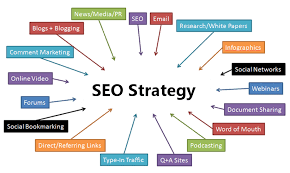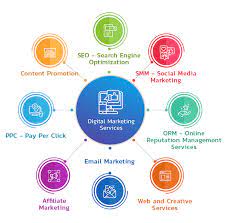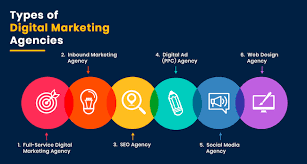The Importance of SEO Strategy in Digital Marketing
In the fast-paced world of digital marketing, having a solid SEO (Search Engine Optimization) strategy is crucial for businesses looking to improve their online visibility and attract more organic traffic to their websites. SEO plays a significant role in helping websites rank higher in search engine results pages (SERPs), ultimately driving more targeted traffic and potential customers.
Key Components of an Effective SEO Strategy
Keyword Research: Understanding the keywords your target audience is using to search for products or services is essential. Conduct thorough keyword research to identify relevant and high-volume keywords that you can strategically incorporate into your website content.
On-Page Optimization: Optimizing on-page elements such as meta tags, headings, images, and internal links can help search engines better understand the relevance of your content. Ensure that your website is user-friendly and mobile-responsive for improved rankings.
Quality Content Creation: Creating high-quality, relevant, and engaging content is key to attracting both users and search engines. Regularly update your website with fresh content that addresses the needs and interests of your target audience.
Link Building: Building a strong backlink profile from reputable websites can significantly impact your website’s authority and credibility in the eyes of search engines. Focus on earning quality inbound links from relevant sources to boost your SEO efforts.
The Benefits of a Strong SEO Strategy
Increased Organic Traffic: By implementing an effective SEO strategy, businesses can attract more organic traffic to their websites without relying solely on paid advertising campaigns.
Improved User Experience: A well-optimized website with valuable content and easy navigation enhances the overall user experience, leading to higher engagement rates and lower bounce rates.
Higher Conversion Rates: Targeting specific keywords and optimizing your website for search engines can result in better visibility among potential customers who are actively searching for products or services like yours, leading to increased conversion rates.
Conclusion
In conclusion, incorporating a robust SEO strategy into your digital marketing efforts can significantly impact your online presence and business growth. By focusing on key elements such as keyword research, on-page optimization, quality content creation, and link building, businesses can improve their search engine rankings, attract more organic traffic, and ultimately achieve their marketing goals.
Mastering SEO: Essential Strategies for Digital Marketing Success
- Is SEO a marketing strategy?
- What is the SEO strategy in digital marketing?
- What are the 7 types of SEO?
- What are the 4 types of SEO?
- What are the top 5 SEO strategies?
- What are the top 3 SEO strategies?
- What are the top three SEO strategies?
- What is an example of SEO marketing strategy?
Is SEO a marketing strategy?
In the realm of digital marketing, SEO (Search Engine Optimization) is indeed considered a fundamental marketing strategy. SEO plays a pivotal role in enhancing a website’s visibility and ranking on search engine results pages, thereby attracting organic traffic and potential customers. By strategically incorporating SEO tactics such as keyword research, on-page optimization, content creation, and link building, businesses can effectively market their products or services to a wider audience online. Ultimately, SEO serves as a powerful tool within the broader spectrum of marketing strategies, enabling businesses to improve their online presence and drive sustainable growth in the competitive digital landscape.
What is the SEO strategy in digital marketing?
In digital marketing, the SEO strategy refers to a set of techniques and practices aimed at improving a website’s visibility and ranking on search engine results pages (SERPs). This strategic approach involves various components such as keyword research, on-page optimization, content creation, and link building to enhance a website’s relevance and authority in the eyes of search engines. By implementing an effective SEO strategy, businesses can attract more organic traffic, improve user experience, and increase conversion rates by ensuring their website is easily discoverable by potential customers searching for relevant products or services online.
What are the 7 types of SEO?
In the realm of SEO strategy in digital marketing, a common question that arises is, “What are the 7 types of SEO?” Understanding the various facets of SEO is crucial for businesses aiming to enhance their online presence and attract relevant traffic. The 7 types of SEO encompass on-page SEO, off-page SEO, technical SEO, local SEO, mobile SEO, e-commerce SEO, and voice search SEO. Each type plays a distinct role in optimising a website for search engines and improving its visibility to target audiences. By incorporating these different types of SEO into their digital marketing efforts, businesses can effectively boost their online rankings and drive organic traffic to their websites.
What are the 4 types of SEO?
In the realm of digital marketing, the question “What are the 4 types of SEO?” is a common query that often arises when discussing SEO strategy. The four main types of SEO are On-Page SEO, Off-Page SEO, Technical SEO, and Local SEO. On-Page SEO involves optimizing individual web pages with relevant content, meta tags, and keywords to improve search engine rankings. Off-Page SEO focuses on building backlinks and online reputation to enhance a website’s authority. Technical SEO deals with website structure, speed, and indexing to ensure optimal performance for search engines. Lastly, Local SEO targets local search results by optimising a business’s online presence for location-based searches. Understanding these four types of SEO is essential for developing a comprehensive and effective digital marketing strategy aimed at boosting online visibility and driving organic traffic.
What are the top 5 SEO strategies?
When it comes to SEO strategy in digital marketing, businesses often wonder about the top 5 strategies to enhance their online visibility and attract more organic traffic. The top 5 SEO strategies typically include comprehensive keyword research to target relevant search terms, on-page optimization to improve website structure and content relevance, quality content creation to engage users and boost search engine rankings, link building to establish authority and credibility, and regular performance analysis to track progress and make necessary adjustments for optimal results. Implementing these key strategies can help businesses improve their search engine rankings, drive targeted traffic, and achieve their digital marketing objectives effectively.
What are the top 3 SEO strategies?
When it comes to implementing effective SEO strategies in digital marketing, businesses often inquire about the top three tactics that can yield significant results. The top 3 SEO strategies typically include comprehensive keyword research to identify relevant and high-volume keywords, on-page optimization to enhance website visibility and user experience, and quality link building to establish authority and credibility with search engines. By focusing on these key areas, businesses can improve their search engine rankings, attract targeted organic traffic, and ultimately achieve their marketing objectives in the competitive online landscape.
What are the top three SEO strategies?
When it comes to effective SEO strategies in digital marketing, the top three approaches that can significantly impact a website’s search engine rankings are keyword research, on-page optimization, and link building. Keyword research involves identifying relevant and high-volume keywords that align with the target audience’s search intent. On-page optimization focuses on optimizing various elements of a website, such as meta tags, headings, and internal links, to improve its visibility and relevance to search engines. Link building plays a crucial role in establishing a website’s authority and credibility by earning quality backlinks from reputable sources. Implementing these three key strategies can help businesses enhance their online visibility and attract more organic traffic to their websites.
What is an example of SEO marketing strategy?
An example of an SEO marketing strategy is the implementation of targeted keywords throughout a website’s content to improve its visibility in search engine results. By conducting thorough keyword research and strategically incorporating relevant keywords into meta tags, headings, and body text, businesses can enhance their website’s search engine rankings and attract more organic traffic. Additionally, creating high-quality and engaging content that addresses the needs of the target audience while adhering to SEO best practices is a crucial aspect of a successful SEO marketing strategy. This approach not only improves the website’s visibility but also enhances user experience and increases the likelihood of converting visitors into customers.




